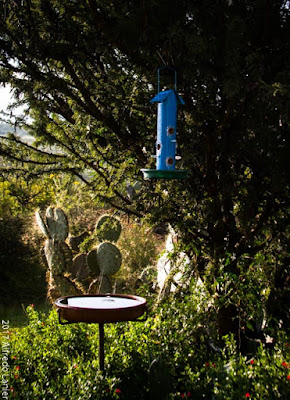Are birds color blind or picky critters?
Birds may have small brains, but they have it
all over people when it comes to colors.
While engaging in one of those mindless and expensive habits that keeps the U.S. economy going—wandering around a Lowe's home improvement center looking for nothing in particular—I ran into a bright-blue metal bird feeder to replace the old and battered plastic model that has been hanging from the tree outside our bedroom window for years and lately held together with piano wire.
There was nothing functionally wrong with the old feeder, except that as I walked by the shiny new model sitting on a shelf at Lowe's it irresistibly whispered to me, "Psst, take me home!". And so I did to the tune of twelve dollars.
Contrary to what Félix thinks, I don't feed wild birds to keep them from starving. I know there's plenty of flowers and other food out there right now.
It's just that I enjoy seeing them flutter about and splash in the birdbath first thing in the morning, a cheerful show sometimes supplemented by rabbits and rats scurrying underneath.
When Félix noted that birds would not like the color of the new feeder I told him in an authoritative tone of voice not to worry, that birds were color blind, like most other animals like dogs.
Then the birds snubbed my shiny new feeder. Only after we put a plastic saucer underneath and filled it with seeds did they hesitantly start to check it out.
"You ungrateful bird-brains," I thought. "I bring you a new feeder and you turn up your beaks at it!"
But this morning i found out—in Google, the source of all wisdom—that in fact not only can birds see colors but many species have more color-detecting cells in their retinas than humans.
Dogs can see colors too, but in a more limited range than people, though canine sniffers are unbelievably sensitive.
I finally retired the old plastic feeder and now birds are using the blue model, but grudgingly.
Indeed, I was walking by yesterday and heard a couple of sparrows snobbishly chirping to each other: "What's wrong with humans? Are they color blind or what?"
###
all over people when it comes to colors.
While engaging in one of those mindless and expensive habits that keeps the U.S. economy going—wandering around a Lowe's home improvement center looking for nothing in particular—I ran into a bright-blue metal bird feeder to replace the old and battered plastic model that has been hanging from the tree outside our bedroom window for years and lately held together with piano wire.
There was nothing functionally wrong with the old feeder, except that as I walked by the shiny new model sitting on a shelf at Lowe's it irresistibly whispered to me, "Psst, take me home!". And so I did to the tune of twelve dollars.
 |
| "Here, birdie, birdie." |
It's just that I enjoy seeing them flutter about and splash in the birdbath first thing in the morning, a cheerful show sometimes supplemented by rabbits and rats scurrying underneath.
When Félix noted that birds would not like the color of the new feeder I told him in an authoritative tone of voice not to worry, that birds were color blind, like most other animals like dogs.
Then the birds snubbed my shiny new feeder. Only after we put a plastic saucer underneath and filled it with seeds did they hesitantly start to check it out.
"You ungrateful bird-brains," I thought. "I bring you a new feeder and you turn up your beaks at it!"
But this morning i found out—in Google, the source of all wisdom—that in fact not only can birds see colors but many species have more color-detecting cells in their retinas than humans.
Dogs can see colors too, but in a more limited range than people, though canine sniffers are unbelievably sensitive.
I finally retired the old plastic feeder and now birds are using the blue model, but grudgingly.
Indeed, I was walking by yesterday and heard a couple of sparrows snobbishly chirping to each other: "What's wrong with humans? Are they color blind or what?"
###

Comments
Post a Comment
Let us hear your opinions, thoughts and comments